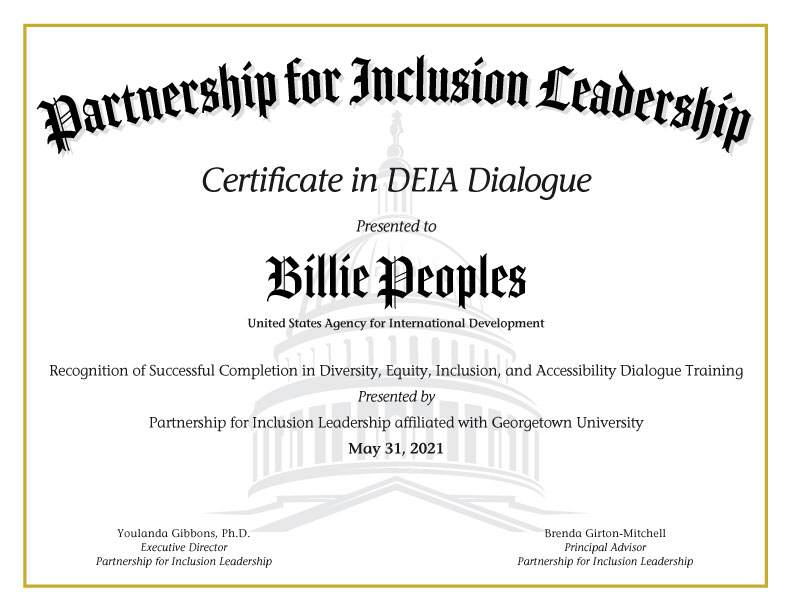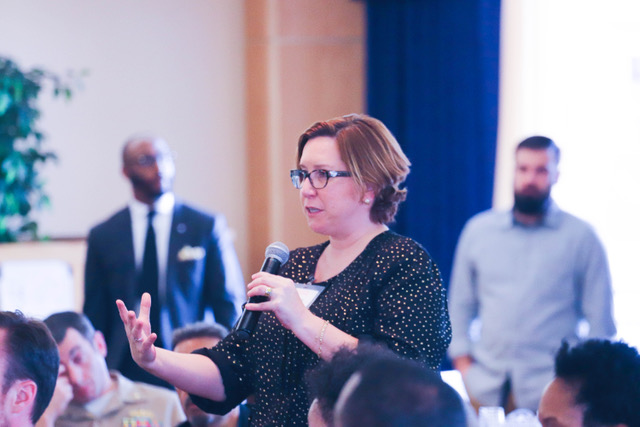About
The Institute for Federal Leadership
The Institute for Federal Leadership (the Institute) is the premier training program offered by the Partnership for Inclusion Leadership. The Institute is an outgrowth of President Barack Obama’s Executive Order 13583 – Establishing a Coordinated Government-wide Initiative to Promote Diversity and Inclusion in the Federal Workforce.
The Office of Personnel Management, the human resources arm of the Federal government, was made responsible for ensuring that the mandates of the Executive Order are carried out. In response to this mandate, OPM and Georgetown University brought cutting-edge thought leadership on diversity and inclusion (D&I) through the inauguration of the 2012 “DI2G”- Diversity, Inclusion and Innovation in Government.

The invitation-only DI2G Conference was presented on October 9-11, 2012 and was the first-ever Federal national conference offering its participants cutting-edge discussions on diversity, inclusion and innovation. Select topics include, but were not limited to: managing social and cultural identities; changing dynamics within military culture to address D&I and the opportunities and challenges it presents; current D&I best practice solutions in the Federal sector, successful public-private partnerships that leverage D&I; D&I research findings that presents innovation considerations; real-time, practical solutions to current D&I resistance in the Federal government sector; global and economic trends and their D&I implications for the Federal sector; and managing diverse populations in the 21st Century.
The success of the DI2G conference was marked by over 300 participants, 40 session presenters, and 25 keynote and plenary session speakers. Participants, representing all Federal executive departments, received the Inaugural Certificate of Mastery in D&I presented by Georgetown University in collaboration with the Office of Personnel Management. Given its impact, the need for a central and physical location for continued growth and development of the D&I profession resulted in the establishment of the Institute for Federal Leadership.
The Institute provides on-going education and training in diversity and inclusion D&I for the Federal government and the Military. Our training provides the physical and virtual location for diversity practitioners and executives to preserve and enhance the mission and values of their agencies in alignment with D&I ideals and principles
Certificate of Mastery In Diversity & Inclusion

The Institute for Federal Leadership is proud to offer the Certificate of Mastery in DEIA. The Certificate of Mastery in Diversity, Equity, Inclusion, and Accessibility is awarded to individuals who complete the Government-wide Recommended Competencies for Diversity & Inclusion. The three-session program provides an intimate setting where D&I practitioners and managers are exposed to best practices, new technologies, case studies and facilitation centered on evidence-based knowledge and training. Participants of the Institute for Federal Leadership are challenged, encouraged and inspired by our world-class presenters, keynote and featured speakers.
Supported by Georgetown University, the Certificate acknowledges an understanding of D&I at the awareness proficiency level and provides foundational knowledge of D&I strategy, tactics, decision-making and evaluation.


The Beginning
Established as the Institute for Federal Leadership in Diversity & Inclusion, the Institute was the vision of Dr. Youlanda Gibbons, Professor of Sociology, author, and diversity strategist, and supported by Dr. J. Bruce Stewart, former Deputy Director of OPM Office of Diversity & Inclusion, author, and consultant. The Institute was purposed to provide high quality education and training for Federal employees in the new and emerging profession of diversity and inclusion.
On June 15-17, 2016, the Institute was launched at Georgetown University and hosted by the McDonough School of Business, Washington D.C. Ten faculty members were invited to teach classes in the key competency areas of Strategic Leadership and Strategic Communication from the academy, Federal government, private and non-profit sectors.
Dynamic keynote and featured speakers imparted insight and knowledge concerning the new government-wide mandates for D&I. The Institute was presented by partner organizations—Georgetown University Office of Institutional Diversity & Equity, the National Association of Diversity Officers in Higher Education, with participation by the Office of Personnel Management Office of Diversity & Inclusion. Today, the Institute continues to make a difference in maturing D&I practitioners and managers through the execution of on-going sessions and special initiatives that capture the challenges of and opportunities for D&I strategy and practice.

Competency Areas
The Institute for Federal Leadership curriculum requires that participants read, self-reflect, engage in discussion and apply theory to real-life workplace situations. Mentoring and networking are crucial aspects of the Institute for Federal Leadership and allow for greater opportunities to brainstorm and problem-solve.
Strategic Leadership
Present and discuss how future diversity practitioners and senior executives must develop new insights and competencies for dealing with new challenges of leading in a changing environment. This task requires practitioners to move from diversity awareness and sensitivity to leadership effectiveness and measurable mission results. Skills for leading at the strategic level are more complex.
The session will cover the following Learning Objectives:
- Assess the strategic diversity framework – Has Diversity Changed?
- Review and update value proposition – the Mission Case
- Evaluate the difference between strategy and strategic planning
- Examine internal communication to support Diversity & Inclusion
- Understand the influences of organizational change – the Practitioner Viewpoint
- Assess the agency climate for Strategic Diversity
- Create accountability measures for Diversity and Inclusion – Revisited
- Understand better how sustaining Strategic Diversity and Inclusion impacts mission success
Strategic Communications
Diversity and Inclusion initiatives should be supported by cross-cutting communication messaging and support tools to involve and inform Federal employees, the Military, supervisors, leaders, and external stakeholders in supporting D&I. Diversity communication also reflects how organizations behave, perceive and think about diversity and inclusion principles.
A well-designed communication plan with support tasks clarifies the diversity message and identifies stakeholders who have an interest in growing the diversity initiative. However, agencies must be willing to identify communication needs and the methods used to reach out to constituents. Communication planning establishes channels, procedures, and expectations that will keep stakeholders informed of the status and progress of diversity and inclusion behaviors. These efforts will sustain lasting culture change which is organic and values driven.
The session will cover the following Learning Objectives:
- Engage internal and external stakeholders
- Understand how to brand the agency’s Diversity and Inclusion program
- Understand what Active Communication is
- Understand what Passive Communication is
- Advance the practice of “listening” to others and to relevant channels and sources
- Build a competitive D&I Communication Plan
- Assess the effectiveness of the D&I Communications strategy
D&I Measurement
Many organizations subscribe to a prevailing myth that when it comes to the impact of diversity on organizational performance, there’s “no way to measure this stuff.” However, forward thinking D&I experts disagree. In fact, they claim “if it moves, you can measure it!” There are sound accomplished recommendations, metrics, and statistics to prove it.
The session will cover the following Learning Objectives:
- Experience a deep dive into “big data” guided by OPM and other agencies D&I measurement requirements and outcomes
- Learn traditional and nontraditional ways of using data to implement D&I strategies and programs more effectively
- Learn how to use compelling stories accompanied with well-analyzed data for greater insights into D&I
- Understand the dynamic and successful ways to engage with others who are responsible for data driven agency performance
Change Management
Without understanding the practice of Change Management, there is a significant risk of failure when implementing D&I strategies and initiatives. Successful change requires the adoption of new mindsets, processes and technologies in order to reach D&I targets and achieve benefits.
The session will cover the following Learning Objectives:
- Understand cultural orientation and its effect on managerial decisions, behaviors and expectations
- Understand how certain “aspects” of management behaviors can affect success with employees
- Understand how to reframe existing practices to reach D&I goals
Building Coalitions
Research indicates that one important behavior has a significant impact on D&I—collaboration. D&I practitioners and senior managers must work cooperatively with others to effectively lead teams and groups. In modern organizations, those charged with leading D&I efforts must work across organizational boundaries to achieve shared goals. This work requires building coalitions internally and externally to achieve common goals. Building coalitions establishes alliances, allows the sharing of best practices and breaks down barriers.
Current and future D&I practitioners and senior managers must demonstrate competencies that address barriers and resistance to and even fear of developing partnerships and collaborations. Skills for building coalitions at the strategic level is complex.
The session will cover the following Learning Objectives:
- Develop strategic partnerships and coalitions and execute D&I initiatives in a meaningful way
- Engage in dialogue and conversation with D&I partners in a “win-win” way
- Evaluate self-interest, competition, lack of trust and turf issues in building coalitions
- Assess who gets in and who stays out?
- Assess Who is truly in charge? Where and Why?
- Assess agency climate for building and sustaining coalitions
- Develop leveraging tools and skills to enhance pipeline development for diverse partnerships
- Appraise accountability for Diversity and Inclusion – Revisited
- Determine how to sustain the D&I Coalition, or should we?
Past Presenters
As a world-class education and research-oriented program, the Institute is host to extraordinary presenters who represent the Federal government, American higher education, the non-profit and private sectors. Participants seek answers to complex questions, discover new knowledge, learn to lead inclusively and prepare government agencies for the future.
